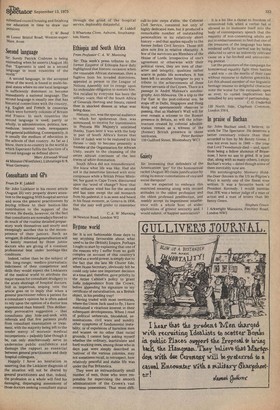Consultants and GPs
From Dr K. Liddell
Sir: John Linklater in his recent article (August 23) very properly draws attention to the sagging NHS hospital service and woos the general practitioners by paying tribute to their bastion-like contribution to the support of the service. He dwells, however, on the fact that consultants are nowadays forced to do much of the routine detailed preparatory work themselves and sourly and sweepingly ascribes this to the incompetence of their juniors. Such an arrogant, ill-informed generalisation will be keenly resented by those junior doctors who are giving of a constant professional best under bondage-like conditions.
Indeed, rather than be the subject of this long-range, medico-journalistic indictment of their competence and skills they would expect the Linklaters of the medical world to attribute the major reason for consultant drudgery to the acute shortage of hospital doctors. Still in imperious, sniping vein the article goes on to imply that when a general practitioner refers a patient for a consultant's opinion he is often asked to rely upon the opinion of a doctor less experienced than himself. This deliberately provocative suggestion — that consultants play hide-and-seek with referrals and that few patients profit from consultant examination or treatment, with the majority being left to the tender mercy of moronic medical incompetents — palpably false though it be, can only mischievously serve to undermine public confidence and damage the rapport so essential between general practitioners and their hospital colleagues.. Happily I have no hesitation in asserting that the Linklater diagnosis of the situation will not be shared by general practitioners and that, indeed, the profession as a whole will find his damaging, disparaging assessment of those doctors seeking consultant status
through the grind of the hospital service, deplorably distasteful.
K. Liddell 5 Whartons Close, Ashurst, Southampton, Hants.


































 Previous page
Previous page